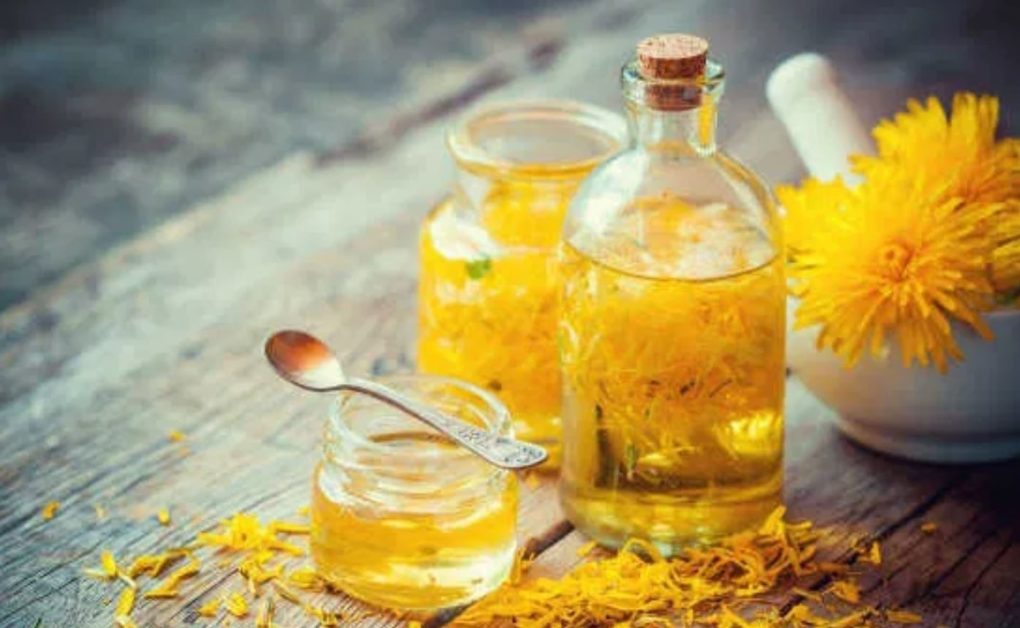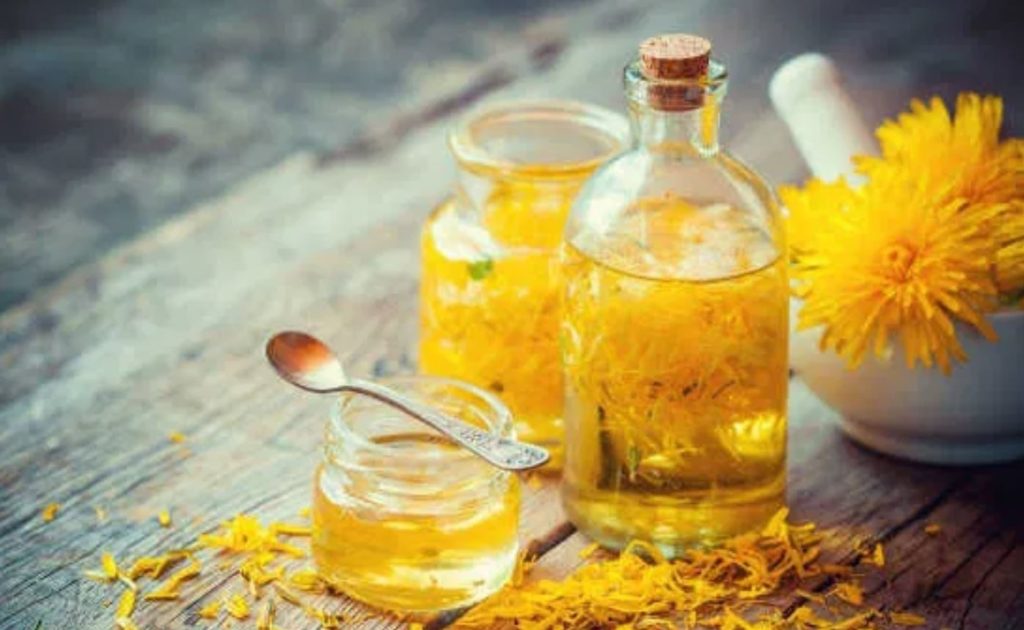How To Make Dandelion Infused Oil
Dandelions are popping up in yards across America; and while some believe this to be an invasive weed, it is a powerhouse in the homesteading world.
The dandelion is a perennial, and it contains a wealth of vitamins and nutrients, as well as naturopathic applications that are astounding. The dandelion is edible in its entirety, which is really good to know from a survival perspective. They also grow upon a taproot, an important consideration as they will grow back if harvested from the surface and the root is left alone.
These unassuming blossoms can be used as a remedy for a number of different ailments as well as for food. From a health standpoint, dandelion greens are chock full of vitamins A, B, C, and D, as well as minerals, such as iron, potassium, and zinc (in its raw form), and a good source of calcium and potassium. The young leaves can be harvested and added to salads and stir-fry dishes. As well, dandelion roots can be gathered, dried and ground up to make “coffee” or tea. To make this coffee alternative, the roots of young dandelion plants are harvested and roasted to a dark brown color. Then, make your coffee as you normally do.
Widget not in any sidebars
In previous article on dandelions:
After rinsing the dandelion off in cold water, you can chop them up and eat them in your salads. There is also another way that I personally prefer to eat them. Parboil them lightly, just to take out the crisp without making them go completely limp or wilted. Then drain them off in a colander. Next, throw them in a frying pan with about ¼ cup of olive oil, and sauté, adding fresh chopped cloves of garlic. It comes out with the taste and consistency of spinach. Throw a little bit of butter and salt on it, and it is delicious.
In the past I have harvested dandelions to make the following recipes:
Medicinally, you can make a dandelion tincture to take as a blood and liver tonic. Further, past studies have shown that dandelion tea lowers levels of blood sugar and can, in turn, alleviate symptoms of diabetes. It removes excess sugar that is stored in the body due to its diuretic properties and helps in stimulating the production of insulin from the pancreas. That said, more studies are needed to verify the past studies on this subject.
Another medicinal use for dandelions are its leaves. It has been shown that dandelion leaves can help with kidney function. Most scientific studies of dandelion have been in animals, not people. Traditionally, dandelion has been used as a diuretic, to increase the amount of urine and eliminate fluid in your body.
Dandelion flowers has antioxidant properties and may also help improve the immune system. According to an article at Healthline, “research indicates that dandelion may have antimicrobial and antiviral properties, which could support your body’s ability to fight infection. Several test-tube studies found that dandelion extract significantly reduced the ability of viruses to replicate. Research also indicates that some of the active compounds in dandelion protect against various harmful bacteria.” It is could also be helpful to immune system because of its excellent source of vitamin C. Try making a tea out of the flowers to improve your immune system. As well, it will naturally detoxify the body and fight water weight or bloating. Dandelions also aid our digestive system by maintaining the proper flow of bile. Dandelion tea helps with mineral absorption and soothes the stomach lining,
5 Helpful Tips For a Successful Oil Infusion
- Make sure you are getting your plants from a location that isn’t near a road or hasn’t been sprayed with chemicals.
- Collect your plants on a sunny afternoon during a week that’s had very little rain or no rain. This helps prevent your dandelions from mold.
- Make sure your glass jars for the infused oils are completely dry and sterilized, if possible. This includes the lid! Make sure any tools you use also do not have water on them.
- Label your jars with the name of the oil and the date you made it to help keep your natural medicines and tinctures organized.
- Most infused oils will last for a year or longer, if stored correctly. A sign that your infused oil is oil is if it begins to have a smell. This means that your oil infusion is going (or already gone) rancid and the oil will need to be discarded.
Dandelion Infused Oil
- 1 pint jar with lid (sterilized)
- 3-4 cups dandelion blossoms
- olive oil
- The day before you are going to make your infused oil, you will want to collect your dandelion blossoms. Gently cut the dandelion heads from the stem and when you get a bunch of dandelions, carefully shake them off to help remove any possible residents. I try and collect three to four cups of blossoms. As a note: Don’t take all of the dandelions. These blossoms are some of the first flowers to bloom and bees depend on it as their first food. As a note try not to take more than 40% of each plant.
- Place your freshly picked dandelions in a paper bag and allow them to wilt for 12 hours before making the infused oil. This will help the blossoms dry out a little to prevent the blossoms from molding and will also help being the medicinal properties out more to prevent a more potent infused oil in the long run.
- Fill your glass jar half full with the dandelion blossoms and and then completely cover them with your oil right up to the brim. Remove air bubbles that may be trapped by using a spoon or butter knife to gently stir the plants. Cover tightly. Place the jar in a warm and sunny spot and let it steep for only 2 weeks.
- Shake the jar once a day to ensure the medical properties are incorporating with the oil. Don’t store it for long periods in sunlight though, as it tends to fade flowers over time.
- After 1-2 weeks has passed, strain the infusion through a thick sieve or using a cheesecloth.
- Store your infused oil in a cool, dark place.
Uses
Because of the presence of various bioactive compounds like polyphenols, dandelions have anti-inflammation properties that would be great to use in homemade moisturizers. Try adding it to a 2:1 mixture of shea butter and coconut oil in a double boiler. As the balm cools, it will solidify and become an excellent everyday moisturizer. It can also be used as a massage oil (one of the medicinal properties in dandelions is that it helps to relax muscles and relieve tension). Other uses include using the oil in place of your regular carrier oil for homemade beauty products like for lip balm, lotion bars, or in salves.
You can make a cough soothing syrup. We found this dandelion cough syrup recipe and plan on making it soon!
Dandelion cough syrup:
- 250 dandelion flowers
- 4 cups raw honey
- 2 lemons
- 1 l of boiled and cooled water
- Rinse and pat dry the flowers. Put them in the pot with the sugar or honey, pour the cooled boiled water and squeeze in the lemon juice.
- Boil on a low heat until the liquid reduces at least by half and gets thick and sticky.
- Strain the syrup and pour into a sterilized glass bottle or jar.
- Store in a cupboard and use as a cough relief.
As you can see, the dandelion has many uses and rather than trying to get rid of it from yard, it should be encouraged to grow. How do you use dandelions in your homemade products?
This article was originally published at Ready Nutrition™ on April 11th, 2020
Subscribe for natural health news to your inbox. Follow Natural Blaze on YouTube, Twitter and Facebook.




